
The Weathersfield Center Historic District encompasses a small cluster of buildings and a historic site at the geographic center of the town of Weathersfield, Windsor County, Vermont, United States. It includes the town's second church building, the home of its first settled minister, and an early stone animal pound. It was listed on the National Register of Historic Places in 1980.
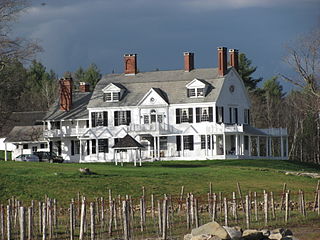
Brook Farm is a historic country estate farm at 4203 Twenty Mile Stream Road in Cavendish, Vermont. It includes one of the state's grandest Colonial Revival mansion houses, and surviving outbuildings of a model farm of the turn of the 20th century. It was listed on the National Register of Historic Places in 1993. The property is now home to the Brook Farm Vineyard.

The Hyde Log Cabin is a historic log cabin on U.S. Route 2 in Grand Isle, Vermont, United States. It was built in 1783, and occupied by the Hyde family for 150 years. Believed to be one of the oldest log cabins in the US, it was added to the National Register of Historic Places in 1971.

The Stone-Darracott House is a historic house on Old Marlborough Road in Dublin, New Hampshire. It was built in 1792 by John Stone, an early settler of Dublin for whom nearby Stone Pond is named. The house was also made part of a "gentleman's farm" by Mrs. Alberta Houghton in the early 20th century, along with the adjacent Stone Farm. The house was listed on the National Register of Historic Places in 1983.

The Furnace Grove Historic District encompasses the remains of a historic 19th-century iron processing facility near Bennington, Vermont. Located on the north side of Vermont Route 9 east of the town center, its production peaked in the 1830s, and was afterward converted into a gentleman's farm. Surviving elements of its past include the remains of iron smelting furnaces, housing, and agricultural outbuildings. The district was listed on the National Register of Historic Places in 1997.
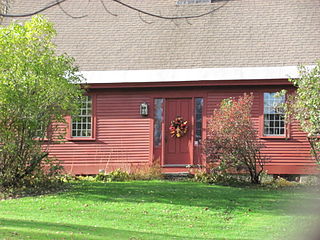
The Atherton Farmstead is a historic farm property at 31 Greenbush Road in Cavendish, Vermont. The farmhouse, built in 1785, is one of the oldest in the rural community, and is its oldest known surviving tavern house. It was listed on the National Register of Historic Places in 2002.
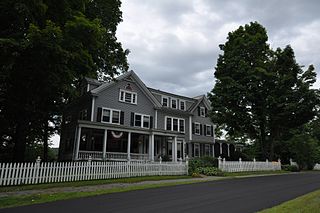
The Dewey House is a historic house at 173 Deweys Mills Road in Hartford, Vermont. Built in 1876 by a local mill owner, and remodeled in 1903, it is a high quality local example of residential Colonial Revival architecture. It was listed on the National Register of Historic Places in 1999.

The Gen. Lewis R. Morris House is a historic house and farm property at 456 Old Connecticut River Road in Springfield, Vermont. Its main house, built in 1795, is well-preserved local example of Federal architecture with later Greek Revival features. The property also includes well-preserved 19th-century agricultural buildings, and was listed on the National Register of Historic Places in 1992.

The Isaac M. Raymond Farm, now Uphill Farm, is a historic farm property on North Bridgewater Road in Woodstock, Vermont. The farm is the reduced core of a larger farm property accumulated in the first half of the 19th century by Isaac Raymond, and revived as a gentleman's farm in 1940. The property includes an altered 1805 Cape style farmhouse and 20th-century Colonial Revival farm buildings. It was listed on the National Register of Historic Places in 1993.

The David Sumner House is a historic house at 4 Station Road in Hartland, Vermont. Built about 1807, it is a fine local example of Federal period architecture, exhibiting the influence of architect Asher Benjamin. It was built for David Sumner, a major local landowner and operator of sawmills. The house, now the Sumner Mansion Inn, was listed on the National Register of Historic Places in 1989.
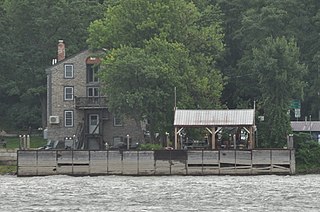
The Larrabee's Point Complex consists of a collection of ferry-related buildings and structures at the western end of Vermont Route 74 in Shoreham, Vermont. Included are facilities currently used by the oldest operating ferry on Lake Champlain, the Ticonderoga-Larrabees Point Ferry, and two buildings historically associated with the ferry operation. The complex was listed on the National Register of Historic Places in 1980.
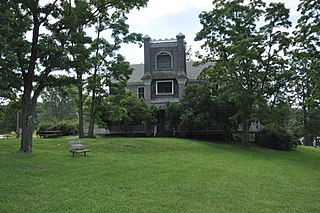
The Hawley's Ferry House, also known just as the Hawley House, is a historic house on the shore of Lake Champlain in Kingsland Bay State Park, Ferrisburgh, Vermont. Built about 1790, it is one of the few surviving 18th-century buildings on the Vermont side of the lake. It was listed on the National Register of Historic Places in 1978.
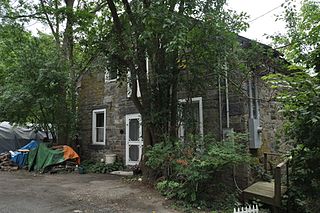
Chipman's Point is a historic 19th-century ferry complex on Chipman Point Road in Orwell, Vermont. The complex includes two early 19th-century stone warehouses, a former Lake Champlain ferry landing site, and the foundational remains of the Chipman Point Hotel. It was listed on the National Register of Historic Places in 1996.

The Grand Isle County Courthouse is located at 3677 United States Route 2 in the center of North Hero, the county seat of Grand Isle County, Vermont. Built in 1824, it is one of the oldest surviving courthouses in the state, and the only surviving one built out of stone. It was listed on the National Register of Historic Places in 1996.

The Gale-Bancroft House is a historic house on Brook Road in Plainfield, Vermont. Built about 1840, it is one of a significant number of period brick houses in the town, unusual given the region's typical dependence on wood products for residential construction. It was listed on the National Register of Historic Places in 1984.

The District No. 2 School is a historic school building at 2442 Polly Hubbard Road in Georgia, Vermont. Built in 1843 and enlarged in 1931, it is a good local example of mid-19th century vernacular Greek Revival school architecture. It was restored in the 1990s after being abandoned for some years, and was listed on the National Register of Historic Places in 2000.

The Montgomery House is a historic travel accommodation on Vermont Route 118 in the center of Montgomery, Vermont. Built in 1803, it is one of the town's oldest buildings, and it served for many years as a social and civic center in the small community. It was listed on the National Register of Historic Places in 1992.

The South Hero Inn is a historic commercial building at 301 United States Route 2 in the center of South Hero, Vermont. Built in 1829, it is a prominent local example of a stone building with Federal and Greek Revival features, and served as a traveler accommodation until the early 1970s. It was listed on the National Register of Historic Places in 1975. It now houses a bank.

The South Stone School House is a historic school building at Main Street and Quarry Road in Isle La Motte, Vermont. Built in 1843, it served the town as a district school until 1932, and has served as home to its historical society since then. It was probably built by James Ritchie, a noted local Scottish immigrant mason, and was listed on the National Register of Historic Places in 1997.

The Meeting House Farm is a historic farm property at 128 Union Village Road in Norwich, Vermont. Encompassing more than 90 acres (36 ha) of woodlands and pasture, the farm has more than 200 years of architectural history, including a late 18th-century farmhouse and an early 19th-century barn. The property was listed on the National Register of Historic Places in 2020.























